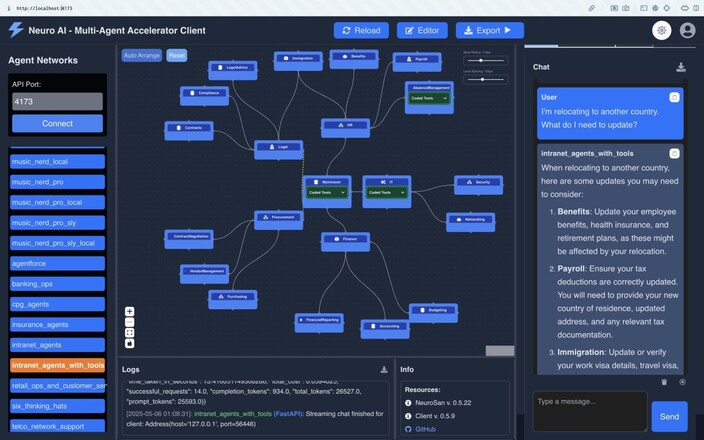
Cognizant has announced the public release of its Neuro AI Multi-Agent Accelerator, an open-source software tool designed to accelerate the development and deployment of multi-agent systems. This release marks a significant milestone in the growing field of agentic AI, enabling researchers, developers, and domain experts to create and test networks of intelligent agents across a wide range of business and scientific applications.
The open-source nature of the accelerator allows users to begin building and experimenting with AI agent networks immediately. Designed to support real-time decision-making and adaptive operations, the tool promotes collaborative development and customization of multi-agent systems. For commercial-scale deployments, Cognizant offers a licensed Multi-Agent Services Suite, which provides the infrastructure needed to manage agent networks in production environments.
The announcement comes amid a projected boom in the AI agent market, expected to grow from 5.1 billion USD in 2024 to 47.1 billion USD by 2030. This surge reflects an increasing recognition among enterprises that networked AI agents can drive new business value, optimize operations, and create entirely new revenue streams. Cognizant’s release of its accelerator aligns with these trends, demonstrating its commitment to advancing practical, scalable AI solutions.
The Neuro AI Multi-Agent Accelerator was developed by Cognizant’s AI Lab and is already being adopted by clients worldwide. Among them is Telstra, Australia’s leading telecommunications and technology company, which is working closely with Cognizant to implement and test multi-agent systems. Kim Krogh Andersen, Telstra’s Group Executive for Product and Technology, commented that open sourcing the accelerator will empower teams to rapidly prototype and integrate AI agents, enhancing the overall software development lifecycle. According to Andersen, early results are already showing improvements in development speed, quality, and efficiency.
Agentic AI
Cognizant is engaged in over 65 client discussions around agentic AI and has already helped organizations in sectors such as healthcare and consumer goods apply the technology. One notable project involved the creation of a network of Contract Negotiator agents for a healthcare provider, designed to speed up the processing of medical appeals. Another initiative supported a packaged goods company in analyzing its supply chain through intelligent agent collaboration.
A key feature of the accelerator is its ability to integrate a diverse set of agents, tools, and knowledge sources. These include retrieval-augmented generation frameworks, service level management tools, and general-purpose large language models. Integration is made seamless through Cognizant’s Model Context Protocol or standard APIs, allowing users to connect with popular third-party platforms such as Salesforce’s Agentforce, Google’s Agentspace, and Crew AI. An optional coordination layer enables agents to self-organize, assign tasks, and route operations effectively, enhancing productivity and reducing errors. The platform also supports the Agent2Agent protocol, promoting cross-platform and cross-organizational collaboration.
Babak Hodjat, Chief Technology Officer of AI at Cognizant, emphasized the importance of experimentation in advancing enterprise AI strategies. He stated that making the accelerator open source gives developers and decision-makers the freedom to innovate quickly and directly observe the business impact of their prototypes.
Salesforce also welcomed Cognizant’s decision. Gary Lerhaupt, Vice President of Product Architecture at Salesforce, noted that the collaboration reflects a shared commitment to building trustworthy, extensible AI solutions. He added that this kind of partnership accelerates customer innovation and reinforces confidence in the deployment of intelligent agents throughout enterprise environments.
Integrating Internal Tools and External APIs
The Neuro AI Multi-Agent Accelerator includes a suite of features designed to streamline development and operation. The Agent Network Designer can suggest a customized agent configuration based on an enterprise’s specific use case, helping teams move from concept to implementation more efficiently. Developers can use natural language commands or prebuilt templates to build systems for applications such as customer service, loan processing, or retail optimization.
The accelerator supports scalable and distributed operations, with capabilities to connect both internal tools and external APIs. Agents can be deployed across multiple servers, enabling global distribution and parallel processing. It is compatible with both public and private cloud environments and supports most open-source and commercial large language models.
Security and compliance are also built in. The system isolates sensitive data through private channels, making it suitable for industries with strict regulatory requirements such as healthcare and finance. It also includes tools for testing agent networks, identifying potential bottlenecks or integration failures before deployment.
Cognizant has already implemented the accelerator internally through its enterprise intranet platform, 1Cognizant, which serves over 330,000 employees. The platform integrates numerous agents to assist staff with everyday tasks such as booking meetings, requesting transportation, or navigating complex HR procedures. The use of agent networks in this context has helped streamline internal workflows, enhance employee support, and improve overall productivity.
By releasing the Neuro AI Multi-Agent Accelerator to the public, Cognizant is positioning itself as a leader in the next phase of enterprise AI. The decision to open source such a sophisticated tool reflects a broader strategy to drive adoption, encourage experimentation, and enable a more flexible, modular approach to intelligent system design.





